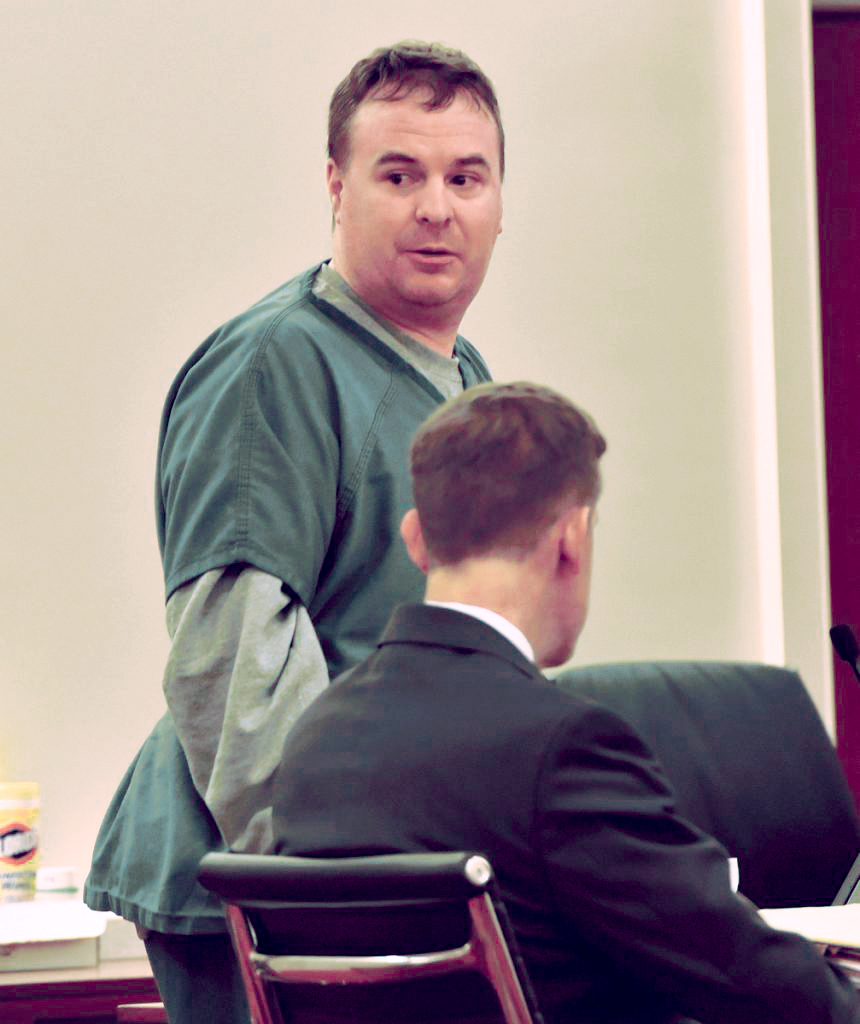AUGUSTA — Jeremy Clement, the Fairfield man found guilty of attempted murder in the shooting of his ex-girlfriend, was sentenced to 17 years in prison on Monday, a sentence that the victim, Jasmine Caret, did not consider harsh enough.
A jury found Clement, 36, guilty on May 23 of all charges against him, burglary, assault, aggravated assault and attempted murder, for the April 2017 shooting. Justice William Stokes also found Clement guilty of illegal possession of a firearm, through his own admission.
At his sentencing trial that lasted about two hours, Clement was sentenced to 22 years in prison with all but 14 years suspended on the four charges. He was sentenced to an additional three years for illegal possession of a firearm. He will serve a six-year probation period after he is released.
Speaking before the sentence was delivered, Clement, wearing a blue jumpsuit and shackles, said he was sorry for his actions. Choking back tears in the crowded courtroom, he acknowledged how difficult the ordeal was for Caret, but that it was also difficult for him.
“I really don’t know what to say,” he said, “but I never meant for this to happen the way it did.”
After the sentence was delivered, Caret said she was happy Clement got a long sentence but it was not harsh enough. She wanted the maximum he could have received: 30 years in prison.
“I wish he would have gotten longer, but any little bit helps,” she said outside the courthouse Monday afternoon.
Caret said she wanted the sentences to run consecutively. Excluding the firearm charge, the sentences for burglary, the assault charges and attempted murder are to run concurrently for 14 years with the sentence for the firearm charge running consecutively for the total of 17 years.
Clement “didn’t totally break me,” Caret said and warned others to be on the watch for signs of domestic abuse.
On April 19, 2017, Clement drove a four-wheeler from his home in Fairfield to where Caret was staying in Oakland with her mother, Roseanna, and her grandmother, May. Clement, armed with a pistol, kicked in the door. He got into an altercation with Roseanna Caret, who defended herself and her daughter with a baseball bat, striking Clement, who then shot Jasmine Caret.
After the shooting, Roseanna Caret said she “beat the crap out of him with a bat.”
Clement pleaded not guilty to the charges in October 2017.
Before Stokes delivered the sentence, Caret addressed the court from a prepared statement.
She still “deeply loved” Clement, she said, and their first few months together were “wonderful.” However, she said Clement changed, and “if he wasn’t happy, nobody was.” She wanted to leave him many times, but was afraid he would kill her and their son. Multiple times Clement had told her if “he couldn’t have me, nobody could.”
Since the shooting, she lives in constant fear, Jasmine Caret said, and while she feels she is emotionally stronger now, she can still see his eyes and feel the gun pressed against her shoulder. At Clement’s trial, she was brought to tears and nearly became ill at the sight of the blood-stained shirt she was wearing when she was shot, which was admitted as evidence. Shot in the shoulder, Jasmine Caret said she now has limited use of her right arm and hand.
“I know when you get released you will come after me to finish what you started,” she said “…You’ve always said you’re not a quitter.”
But she would not let Clement “ruin me,” she said, and she just wanted her family to be safe.
“I hope you take responsibility for the lives you ruined,” she said.
In delivering his sentence, Stokes said a number of factors contributed to the lengthy sentence, most importantly Clement’s long history of violence, including convictions for domestic violence assault, assault, violating protection orders, disorderly conduct and numerous driving violations, including operating under the influence, operating after habitual offender revocation and a number of bail violations.
“What stands out to me is Mr. Clement’s inability to engage in a relationship without it turning somehow violent, or his inability to let go,” Stokes said.
Yet there were mitigating factors, including letters from Clement’s family and friends describing how patient and caring Clement really is. Stokes said there seemed to be two very different Clements before him, the one who almost killed Jasmine Caret, and the one outlined in the letters.
“It’s a difficult process, a difficult position to be in because Mr. Clement does have tremendous potential,” the justice said.
However, Stokes said it was obvious Clement’s bad qualities overtook his good ones that day. The shooting was “a totally avoidable episode” that “did not have to happen.”
While Clement’s action was not the most heinous act of attempted murder, which Assistant District Attorney Michael Madigan also said at the outset of Monday’s proceeding, it was still a serious case. Had Clement killed Caret, he would be spending “decades in a prison cell,” Stokes said.
When the justice delivered his sentence, Clement sat with his head down.
“I hope you get the help you need,” Stokes said, referring to Clement’s history of domestic violence and alcohol abuse. “I hope you put it to good use,” he said, adding that Clement would be relatively young when he is released.
Clement’s violation of several protective orders and his illegal possession of a firearm added to the seriousness of the crime, Stokes said. Ignoring the firearm order was a “separate event” calling for a “separate sentence.”
During the trial Clement testified his relationship with Caret had been “great” to begin with. They had met when he was 16, had been dating for about six years, and had been living together. But when he called the Department of Health and Human Services about Caret’s drinking problem, DHHS then looked at his drinking problem and took his children. Walter McKee, Clement’s defense attorney, said his client felt hopeless at the thought of losing his children: “Him being suicidal is not in dispute.”
However, Assistant District Attorney Michael Madigan, said Clement went to the Oakland home fully intending to kill Jasmine Caret. He pointed out that Clement went to the home with a full magazine of bullets, which he would not have needed to kill himself. He said Clement didn’t come up with the story of planning to kill himself until well after the shooting took place. He also noted that Clement never asked about Jasmine Caret’s well-being after the shooting.
“He didn’t go inside to kill himself. He didn’t go there with one bullet. He went there with a magazine,” Madigan told the jury on May 23.
Madigan had asked for 28 years for Clement, with all but 23 suspended. McKee had asked for 10 years with all but five suspended.
“When we’re talking about seriousness of conduct, the only difference between attempted murder and murder convictions is essentially the outcome of the actions,” Madigan said. “The sentencing has to reflect the seriousness of the conduct.”
McKee argued that Clement had a positive impact on his family and community, that he was a hard worker who was patient and kind. He said Clement felt remorse over what happened.
“He wished it had not happened,” McKee said.
Colin Ellis — 861-9253
cellis@centralmaine.com
Twitter: @colinoellis
Comments are not available on this story.
Send questions/comments to the editors.







